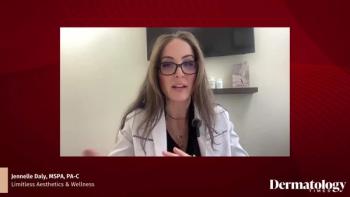
Adewole (Ade) Adamson, MD, MPP: Systemic Racism, Patient Access, and Advancing Health Equity
Adamson recently shared with Dermatology Times about the significance of Vaseline's Mended Murals initiative and the role of dermatologists in improving patient access.
Read more from Dermatology Times
Adewole (Ade) Adamson, MD, MPP, is a board-certified dermatologist based in Austin, Texas, and an assistant professor of Internal Medicine (Division of Dermatology) at Dell Medical School at the University of Texas at Austin. Adamson is also a health services researcher and specializes in caring for patients at high risk for melanoma of the skin, evidence-based medicine, and health policy.
In addition, Adamson served as the director of the Melanoma and Pigmented Lesion clinic at Dell Seton Medical Center.
Adamson recently spoke with Dermatology Times to discuss the Mended Murals initiative and its role in advancing skin health equity, skin health disparities in patients with skin of color, and more.
Q&A
Q: Could you elaborate on why systemic racism and health inequities contribute to worse outcomes and increased mortality rates for skin cancer among people of color?
A: First I would say that mortality rates for skin cancer among people of color are lower than mortality rates for skin cancer in people who identify as non-Hispanic White. However, if you are a person of color and diagnosed with skin cancer it is likely at a later stage with worse prognosis. The reason for later stage diagnosis are multifactorial and in some cases rooted in systemic racism.
- Lack of Resources: A disproportionate percent of Black and Brown people reside in lower income communities which results in less accessible dermatologists within the area and limited access to adequate care and resources. If a patient has a hard time finding a physician, this can negatively impact their need for treatment within an appropriate window of time. For example, my research team has shown that non-White patients have delays in receiving surgical treatment after a diagnosis of melanoma.
- Training for Physicians: When it comes to training physicians, there needs to be more to ensure they are well versed or prepared to spot the signs of skin cancer on people of color. For example, African Americans and other people of color have shown to have symptoms of melanoma on the palm of their hands or soles of their feet which can be overlooked by clinicians who are not familiar with treating these skin types.
Q: How does your work intersect with the goals of Vaseline's Mended Murals initiative, and what impact do you hope it will have on raising awareness about skin health equity?
A: A lot of my research involves understanding patterns of health care utilization including overuse and underuse in dermatology. I’m also interested about health care disparities and creating access to specialty health care. It’s an unfortunate fact that skin health for people of color has long been an afterthought due to systemic racism and healthcare inequities, which can lead to worse outcomes. So, with Vaseline’s Mended Murals initiative, it was great to partner with the brand to shed light on these issues and amplify free skin health resources and education for underrepresented communities.
Q: Can you share any specific experiences or cases that highlight the importance of addressing skin health disparities in communities of color?
A: There was a pediatric patient I saw in my dermatology clinic that was referred by a clinician in the emergency department (ED). The patient was presented to the ED because a mole on her arm was growing. According to the referral, the patient was discharged from the ED with a routine dermatology appointment and not an urgent one. By the time I was able to see the patient 3 months had elapsed and the spot had grown exponentially requiring more aggressive treatment as a result. I often wonder whether the delay happened because the clinician was less familiar with how skin cancers present on darker skin. This experience has motivated me to speak out about the important diversity in not only the dermatology workforce, but also in the education of all clinicians in how to recognize disease across skin types.
Q: Vaseline's Mended Murals initiative aims to increase access to health resources for communities of color. How do you believe initiatives like this can help address systemic issues in health care?
A: Initiatives like Mended Murals are driving awareness about the need to care about skin of color, as well as pointing people toward the resources that were created to help achieve skincare equity. Following the 2022 launch of
To take its commitment even further, Vaseline donated a total of $250,000 to charitable clinics that offer accessible skin health care in each US city where murals are restored.
Q: How do you see the future of dermatology evolving to better address the needs of diverse patient populations?
A: My hope for the future of dermatology when it comes to addressing the needs of diverse communities is that the content of our educational resources mirror the diversity of skin types seen by medical professionals. I also hope that the field of dermatology continues to strive for a composition that reflects the diversity of communities they serve. With that said, diversifying dermatologists will require prioritizing the issues of the profession and funders for research.
In the meantime, I know that not everyone has equal access and there's work to be done, ensuring access to free resources and care for all communities is important which is why I’m glad to partner with Vaseline on their work to achieve skin health equity.
Newsletter
Like what you’re reading? Subscribe to Dermatology Times for weekly updates on therapies, innovations, and real-world practice tips.










